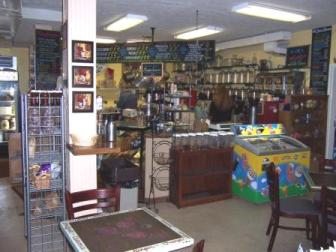| Payne's Store Centreville, Virginia Built c. 1930 |
|
by Debbie Robison October 18, 2008 |
|
On March 15, 1926, Irvin Payne purchased one acre of land from Irene Makely Woltz and Henry A. Woltz on the north side of the Warrenton Turnpike, now known as Lee Highway.[1] On this lot, he constructed a general store. The store was in existence by 1930.[2] To meet the needs of automotive traffic, gas pumps were installed on the property. The Texas Company (Texaco) was given a lease next to the market for a filling station in 1930, and Payne received one cent for every gallon of gasoline sold.[3]
Irvin Payne owned three stores in Fairfax County, located in Bailey’s Crossroads, Oakton, and Centreville. His father, I.E. Payne, began operating a store in Bailey’s Crossroads in 1910. The Oakton Market, later part of the Appalachian Outfitters complex, was in operation by 1933. Operating the stores became a family business. Irvin Payne managed the Bailey’s Crossroads store, and his brothers, Roland and James, operated the Oakton and Centreville stores, respectively. [4]
Originally, Irvin Payne hired a manager to run the Centreville store, but in 1932 asked his brother, James Payne, to run the store because the manager, Mr. Schafer, had a drinking problem. This occurred despite the fact that Prohibition laws severely restricted alcohol consumption. When Schafer could not obtain alcohol, he drank all the vanilla and lemon extract he could get.[5] Mr. Schafer had been employed at the Centreville store for two years.[6]
James and Bernice Payne lived on the building’s second floor in an apartment above the store with their two children: Janice and Colin. When they first moved there in 1932, the upper level was not partitioned with walls. For seven months, Bernice and her husband lived upstairs in one large open space. There was no indoor plumbing, and water was obtained from a pump in the yard. Irvin Payne asked Bernice to draw a plan of how she would like the rooms laid out, and then had the space constructed per the sketch. By 1934 James Payne was making minor improvements to the store’s appearance.
Mr. Jimmie Payne has recently given the interior of his general merchandise store a new coat of white paint, which gives it a very spring-like appearance.[7]

Most of the supplies for the store were obtained from Payne and Sons wholesale store in Bailey’s Crossroads. Lettuce and fresh vegetables were purchased from farmers markets in Washington, D. C. At the back of the store, an icebox held meat, which the Payne’s cut up themselves. They also sold salted fish, which was sold out of a barrel, and corn for chicken feed. For customers with a sweet tooth, the Payne’s had a candy rack display. During Prohibition, the Payne’s had a run on sugar and yeast cakes. Customers bought two- or three-hundred pound sacks of sugar and yeast for making moonshine. Payne’s Store was a social community gathering place where gossip was exchanged, and the men entertained themselves with shooting craps, poker playing, and gambling in a back room. The store was open from 7:00 am or 7:30 am to 10:00 pm, seven days a week.[8]
The store was advertised as selling general merchandise in 1935. By this time, the twenty-first amendment had repealed mandatory nationwide Prohibition. The Payne’s now sold beer, ale, and wine, not just the ingredients to make moonshine. After Prohibition, moonshine ingredients were still in demand.[9]
The store offers a full line of general merchandise, with needs for table, person, farm and home very much in evidence. Automobile requirements are represented in Texaco products, Goodyear tires and Federal batteries. The store’s feature is beer, ale and wine on and off sale.[10]
Payne’s Store sold soap products manufactured by Lux, such as toilet soap (The Beauty Soap of the Screen Stars), Rinso (a laundry detergent), and Lifebuoy Health Soap (Stops “B.O.” – freshens dull skins). Lux, who in 1935 sponsored the Lux Radio Hour on WMAL, offered reproductions of fine paintings as a promotion, available with the purchase of three cakes of soap. A newspaper advertisement proclaimed that purchasers could visit Payne’s Store in Centreville, Virginia, to select a reproduction. Additional stores, including the other two stores owned by Irvin Payne, were also included in the promotion.[11] In 1942, an advertisement calls the store Payne’s Grocery, though general merchandise was also sold.[12]
When Route 66 was being built in the mid-1960s, many of the construction workers came to Payne’s Store in the evening to talk and drink a beer. But the opening of Route 66 to commuter traffic caused a reduction in business at the store, since many customers then bypassed Centreville. The store closed c. 1973.[13] Later uses included a second-hand store and coffee shop.
[1] Fairfax County Deed Book (FX DB) R9(226):489, March 15, 1926. [2] Fairfax County Land Tax, 1930 Reassessment. [3] FX DB W10(257):378, October 15, 1930 [4] Fairfax Herald, November 27, 1936, p.4. [5] Michael Fuchs, “Payne’s Recall Life on Rte. 29: Family Ran Store for 40 years,” CentreView, Date Unknown, newspaper clipping was on display at site. [6] Ibid. [7] Herndon Observer, May 10, 1934, p.1. [8] Michael Fuchs, “Payne’s Recall Life on Rte. 29: Family Ran Store for 40 years,” CentreView, Date Unknown, newspaper clipping was on display at site. [9] Ibid. [10] Fairfax Herald, September 27, 1935, p.3. [11] Herndon Observer, June 27, 1935, p. 8. [12] Herndon Observer, April 2, 1945, p. 8. [13] Michael Fuchs, “Payne’s Recall Life on Rte. 29: Family Ran Store for 40 years,” CentreView, Date Unknown, newspaper clipping was on display at site. |
